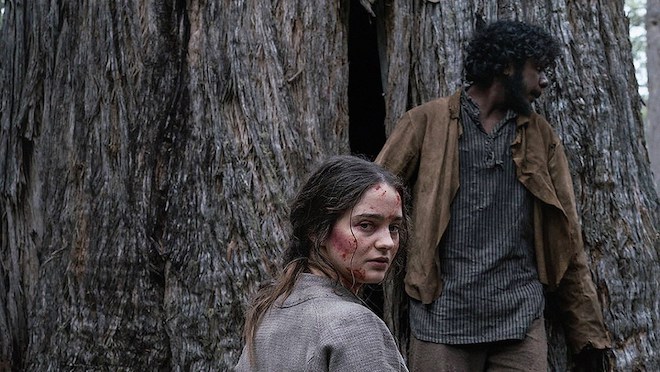Colonial Tasmania ... The Nightingale ... Jennifer Kent's new film takes us deep into our dark past ... Fearless Irish servant girl teams up with Aboriginal boy to hunt down their tormentors ... Our violent history revealed ... As our reviewer Miss Lumière discovers - there will be blood
 Aisling Franciosi and Baykali Ganambarr in The Nightingale
Aisling Franciosi and Baykali Ganambarr in The Nightingale
The horror! The horror!
Jennifer Kent's The Nightingale is full of it, with a British Colonel Kurtz to boot.
Set in Van Diemen's Land in 1825, the film is a visceral, sometimes unwatchable examination of Australia's colonial past, so graphic Miss Lumière found herself crouched on the cinema floor with ears (unsatisfactorily) blocked more than once.
The blows (historical and political too) rain down for over two hours, an assault on the mind, the senses and on our whitewashed account of Australia's "settlement".
Thankfully, Kent's second feature after her quietly successful 2014 debut The Babadook, is worth the pain.
The Nightingale is a violent film about violence - against women, Indigenous Australians, the convict class and so-called civilisation itself - one that has too rarely been told on the big screen.
John Hillcoat's The Proposition, Rolf de Heer's The Tracker and Warwick Thornton's Sweet Country are brilliant exceptions.
Kent adds to the cumulative truth at the dark heart of colonial Australia depicted in these films with a timely twist of her own - the abuse of women.
There are two particularly savage instances shown - the rape of a young Irish convict servant in soldiers' rooms and the rape and murder of an Aboriginal woman who is wrested away from her child in the bush.
While some might see The Nightingale as a revenge narrative (there's injustice, sadism and retribution aplenty) Kent manages to make it an intelligent, albeit bloody, critique of the falsification of the history of our country's origins as well.
She is ably assisted by a talented cast, creepily beautiful Tasmanian wilderness locations, the verisimilitude of our grimy origins, a judicious use of music both traditional and modern, and the odd bit of Dreamtime lore.
As the young Irish servant girl Clare who goes bush in pursuit of her tormentors, Aisling Franciosi conveys both rage and cold determination.
She is the nightingale of the title, a handsome, fearless young woman with a beautiful singing voice who Lieutenant Hawkins (Sam Claflin) has plucked from prison to be his indentured servant.
In a terrible scene early in the film, Clare is raped by Hawkins and his sergeant sidekick Ruse, and her husband and baby murdered.
Soon after, the vainglorious Hawkins sets off by foot for Launceston to demand the promotion he has been denied by a visiting officer (Ewan Leslie).
He is accompanied by a motely crew - his loyal, but vicious sergeant Ruse (another star turn by the omnipresent Damon Herriman), Jago (Harry Greenwood) the bewildered soldier who killed Clare's baby under Hawkins' orders, three miserable convicts and old Aboriginal tracker Uncle Charlie (Charlie Jampijinpa Brown).
Clare hooks up with a young Aboriginal boy Billy, beautifully played by Baykali Ganambarr to track them down.
Billy, a proud Letteremairrener man, has his own spear to grind, his entire family having been killed by white settlers in northern Tasmania.
They make a poignant pair of outsiders, she driven by fury and he by a desire to return to country.
The scenes between these two fine young actors are the soul of the film, although sometimes the dialogue verges on the polemical and their connection approaches the contrived (Billy's totem is "mangana" - the blackbird, to Clare's nightingale).
As they pursue their prey deeper into Tasmania's rugged landscape, they cleave closer while Hawkins and his not-so-merry band of men unravel, raping and pillaging the local tribes.
Hawkins, ever more Colonel Kurtz-like, plunges deeper into depravity, at one point urging a young convict boy to shoot his sergeant.
After a few turns (and deaths), Clare and Billy find Hawkins and Ruse freshly laundered in Launceston.
There will be blood. And there's a lot of it.
Suffice to say, the denouement involves shotguns and spears and one wonderful scene in which Clare confronts Hawkins with his crimes in front of his fellow officers.
It's female power writ large and it leaves the room speechless.
Which is much like Miss Lumière was left at the end.
It won the Special Jury Prize at Venice in 2018, with Baykali Ganambarr winning Best Young Actor.